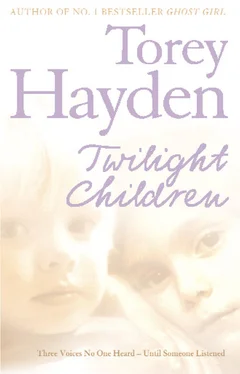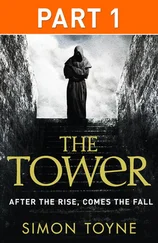Mrs. Baker said she was aware that in all likelihood Cassandra had suffered terribly during her abduction and she tried to take this into account, but even so, why would a nine-year-old spend recess cheerfully helping the school janitor sweep leaves and then come in and say he had tried to push her down the stairs?
Mrs. Baker also wondered if Cassandra could be suffering petit mal seizures. It was a bit of joke with everyone at school, even Cassandra, that she “should have been born blond” because she could be very “ditzy” – not paying attention to what was going on around her, not remembering obvious details about ordinary things. Mrs. Baker didn’t always find the behavior funny. She felt the forgetfulness, which could be very abrupt and out of the blue, was often manipulative in nature and just a further extension of the lying. Occasionally, however, she said Cassandra did genuinely seem not to remember things that had just happened, and this occurred often enough for it to interfere with learning and social interactions. This led Mrs. Baker to wonder if there could be a neurological underpinning for such behavior.
Cassandra’s erratic speech also bothered her. Most of the time, Mrs. Baker said, Cassandra was chatty to a point of being verbose; however, every once in a while she’d suddenly refuse to speak to anyone, and this could last anywhere up to a few days. Mrs. Baker saw no particular pattern to these silences, but they did occur at home as well. Cassandra’s mother was resigned to them, feeling they were another outshoot of the traumatic abduction and the best response was to give Cassandra peace and support and not call attention to them. Mrs. Baker couldn’t be this lackadaisical because not talking interfered with the learning process. Given the randomness of the behavior, Mrs. Baker’s mind again went back to the question of a neurological basis. When she spoke to me, she mentioned Cassandra’s father’s drug problems and wondered if Cassandra had been the victim of any drug-taking while she was with her father, or if there had been some kind of horrible abuse that might have caused brain damage, which was now throwing up these odd neurological signs.
The final concern was what Mrs. Baker called Cassandra’s “creepy” behaviors – actions that, while there was nothing inherently wrong with Cassandra’s doing them, made Mrs. Baker uneasy. Among these was a tendency for Cassandra to turn otherwise ordinary conversations into nonsense. She would be chatting normally and then unexpectedly get what Mrs. Baker described as her “Bad Seed” look. Suddenly her replies would become off-topic, occasionally provocative, and often make little sense. This was a very disconcerting behavior, Mrs. Baker said, because it “felt crazy.” And very off-putting. Other children quickly became disconcerted or irritated and avoided her.
Another creepy behavior was Cassandra’s tendency to pretend she was some kind of animal, like a vulture or a bear, and then only relate to people using shrieks or growls. Often she picked a violent animal and then used the animal’s normal aggression as an excuse for hitting, biting, spitting, or doing other hurtful things. Mrs. Baker said Cassandra often did this playfully, as if she were in control of the behavior and it was only a game; however, she could persist with the animal-like behavior for several hours, despite repeated requests to stop or even punishment.
Neurological investigations turned up no evidence of seizures. The doctors concluded Cassandra’s problems were psychological, most likely part of post-traumatic stress disorder resulting from the abduction, a diagnosis she already carried. She was given a prescription for antidepressant medication and sent home.
Mrs. Baker didn’t see a significant change in Cassandra on the antidepressant, so she persisted in her efforts to pressure the parents into getting more treatment for Cassandra. She claimed the various difficult behaviors were soon going to make it impossible to keep Cassandra in regular education. She kept insisting the parents continue searching for help. Consequently, Cassandra was eventually referred to one of the senior child psychiatrists affiliated with our unit at the hospital. He spent time in Cassandra’s school, observing her, then met with both Cassandra and her parents. In the end he decided it would be beneficial to bring Cassandra to the unit as an inpatient for observation and assessment.
The child psychiatrist, Dave Menotti, was to oversee the case, but I was given the individual daily therapy sessions with Cassandra. Dave’s thinking was that my experience with psychogenic language problems might prove useful here, even though her occasional mutism was not the presenting problem. He described her to me as a child “where something doesn’t add up,” which I knew meant we were still very much in the diagnostic stage. While we assumed we had the source of her problems – the twenty-six-month abduction – we had no understanding of how that pieced together with her difficulties now.
Cassandra and I sat together at the table, examining the drawing she had done of her family.
“That’s really quite an elaborate picture. Can you tell me more about it?”
“There I am. Up in the sky,” she said. “I look down on everyone. I can see everyone. I can see everything from the sky.”
“That sounds interesting, being able to see everything.”
She nodded. “I like being an alien.”
“If I were an alien, I think I would feel lonely,” I said, “because I’d feel I was different from everyone else. I’d feel like an outsider.”
“No, not me. I like it,” she replied. “Because I can travel in a rocket ship.”
Cassandra was a rather wriggly little girl, squirming around in her seat, bending her head down and around in a way that allowed her to look up at me while I regarded the picture. There was something coy about her behavior. This made me wonder if she had chosen to draw herself as an alien because she genuinely felt like an alien or if she had chosen to do it as a way of engaging me, as a sort of savvy assessment of what she’d thought a therapist would be interested in.
“And here we have your family,” I said. “Yes? Your mother, your stepfather, your two sisters – ”
“And the fish. The fish, too,” she interrupted and pointed to them.
“Ah, I thought they were leftover from when you were experimenting with shapes …”
“No, they’re living in the sky like it was an aquarium. Goldfish. Really, they’re a family, too. That big one’s the dad. And that’s the mom goldfish. And those are the babies. They belong to my other family.”
“I see.”
“Those are my other family there. Remember, because I told you already. They’re outside the aquarium, looking in. That’s why they’re small.” She pointed to the snakes. “Really they’re not snakes. They got snake costumes on.”
“They’re not snakes?”
Cassandra laughed at this. “Silly! They’re people!” She laughed again. “That’s Daddy Snake and Mama Snake and the kid Snakes. And there’s the Minister Snake. And that’s Cowboy Snake. And that’s Fairy Snake.”
“I thought you just said they were people,” I replied, a little confused.
“They are,” she said cheerfully. “‘Snake’ is their last name. That’s because they dress up in snake costumes all the time, so that’s why people started calling them that. And really I’m Cassandra Snake when I live with them.”
“Why do they dress up in snake costumes?”
“Ding-dong, willy-nilly, Peter Pan!” she replied in an unexpectedly loud, singsong voice.
I sat back.
She laughed shrilly.
I sat quietly without speaking.
Читать дальше












